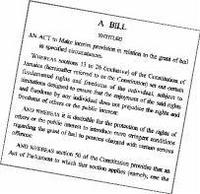
The following is an analysis of one of six bills established to tackle crime, which are currently being debated by a joint select committee of Parliament.
The Government is of the view that certain types of legislation are required to be put in place to strengthen the hand of the security forces in their efforts to bring about a reduction in the crime rate in Jamaica. To that end, six bills have been tabled in the House of Representatives and are now being considered by a joint select committee of Parliament, where members of the public may give their views on the proposals.
The bills are unusual in nature, reflecting, as the Government states, the unusual character of criminal activity in the society. One of the most challenging of these bills is entitled: An Act to Amend the Bail Act.
Few exceptions
Under our Constitution, at every stage of the period that a person remains in peril in relation to a criminal offence, it is the duty of the prosecution to prove every issue that may be in question.
There are few exceptions to that rule, and such exceptions only impose a duty on the person charged to prove "particular facts", for example, that he possesses a valid driver's licence - information which would immediately be within his own knowledge.
So, under Chapter III of our Constitution, which contains the provisions relating to fundamental rights and freedoms, the prosecution has the burden of satisfying a court as to why a person charged with any offence should not be granted bail. The provisions of our present Bail Act are faithful to that rule.
This bill seeks to place the duty on a person charged with certain offences to satisfy the judge or resident magistrate before whom the question of bail is being canvassed that he should be admitted to bail. These 'certain offences' are those set out in a proposed new Schedule to the Bail Act, and they are serious crimes.
They range from murder, through arson of a dwelling house, to extortion, certain offences under the Firearms Act and the Dangerous Drugs Act, trafficking in persons, sexual offences and perverting the course of justice.
What is the rationale?
The object of the proposals in the bill is to add more stringency to some of the provisions in the Bail Act, aimed primarily at persons who are charged with serious crimes and alleged repeat offenders in relation to other crimes. It is said that such persons, rather than honouring the conditions on which they have been granted bail, become a threat to witnesses and commit other crimes.
That was the rationale given by the Government to the Opposition which agreed, at the Vale Royal Talks, to support the proposals, once they have been shown not to be unconstitutional in character.
Can it stand?
The question would quite properly be asked, therefore, whether these proposed amendments, which run counter to the provisions of Chapter III of the Constitution, can be allowed to stand. The answer is provided in another bill that is being considered by the joint select committee and will be addressed along with other issues in a subsequent article.
Under our legal arrangements, no right of appeal is available to the prosecution when the discretion of bail is exercised in a person's favour.
This bill seeks to provide the prosecution with that right, if a ruling has been made for the person to be allowed on bail, to appeal to a judge of the Court of Appeal in Chambers against that order.
To do so, the prosecutor is obliged to give oral notice to the court of such an intention when the ruling is made and before the person takes up the offer of bail.
The prosecutor is then required, within 24 hours, to give to the court and the defendant a written notice of appeal, setting out the reasons which will form the basis of the appeal.
If the prosecutor follows these procedures, the defendant is to remain in custody until the appeal, which is required to be heard within 72 hours after oral notice has been given, is determined.
Failure on the part of the prosecutor to abide by these rules makes the order of bail immediately effective; likewise, of course, if the appeal fails.
A bill that is drafted and tabled in Parliament contains a recital of the Memorandum of Objects and Reasons, after the provisions have been set out. This memorandum is intended to outline the rationale and the policy framework that drive the Bill.
In this instance, the memorandum states that:
"A decision has been taken to amend the Bail Act in order to:
(a) provide, in the case of specified offences, for the onus to be on the defendant to satisfy the court that bail should be granted, and
(b) confer upon the director of public prosecutions, a right of appeal in cases where bail is granted by a court."
This bill seeks to give effect to that decision and is a companion to other proposed legislation aimed at reducing crime.
The memorandum does not explain how the provisions will assist the authorities in its stated aim of reducing the level of criminal activity. It has, however, for some time been in the public domain that there is some disquiet within the security forces and concern among some sections of the general populace that the provisions that govern the grant of bail in certain circumstances are too liberal.


